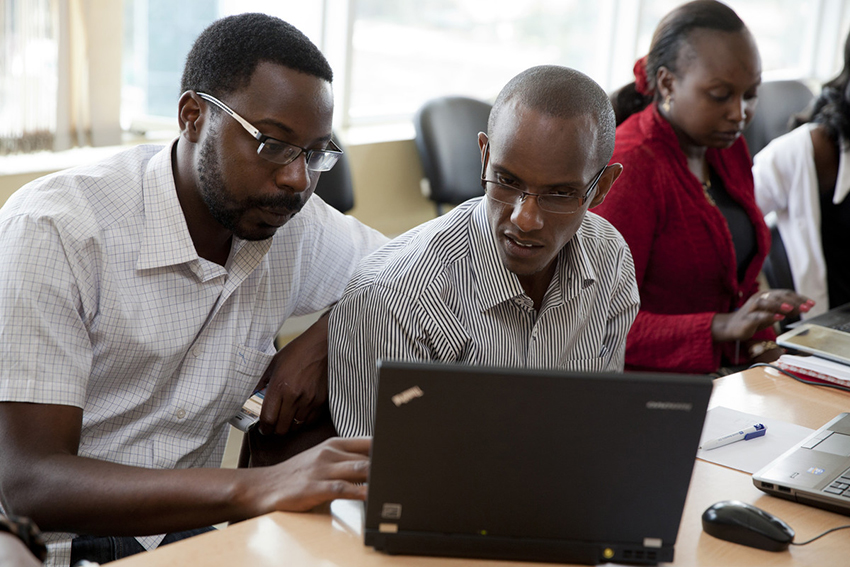
Photo Credit: Jessica Scranton/FHI 360
Artificial intelligence, smart systems, decentralized manufacturing and other technologies are driving major uncertainties around the future of work. Experts from MIT and the World Economic Forum suggest that we are in the midst of a fourth industrial revolution, characterized by new technologies that will affect all industries. As the very nature of work changes rapidly, old jobs are disappearing and new jobs are emerging in every sector of the economy. This has produced a major shift in the demand for skills that is happening worldwide, and we can expect further shifts going forward.
Reducing the lag time between the development of new jobs and the preparation of the workforce to meet new skills needs is a core concern for workers, new graduates, employers and governments. And while the pace of transformation in jobs and skills differ by country and region, evolution along the technological spectrum is taking place everywhere.
What do these changes mean for international human development? Researchers have found that the traditional, staged approach to development — from subsistence agriculture to manufacturing to services — is no longer a viable trajectory for most developing nations. FHI 360’s CEO, Patrick Fine, suggests that demographic changes, urbanization and the impact of new technologies in the United States and developing countries make the creation of opportunities for meaningful economic participation one of the great development challenges of the 21st century.
FHI 360’s approach to preparing the future workforce harnesses our knowledge and networks across the workforce development spectrum, from early grade reading to foundational research on soft skills to upskilling in the workforce. As we work with multiple stakeholders in communities in the United States and other countries, we find that the changes that are needed require stronger partnerships among businesses, educational institutions, policymakers and job seekers. Such partnerships call for systems thinking and high levels of collaboration, transforming what we know, how we learn and how we work.
Transformations in what we know
Access to huge volumes of unstructured, real-time data is increasingly possible with the flow of information, reduced data collection costs due to technological advances and exponential growth in computing capacity. From a workforce development perspective, the ability to harness data and use it in decision-making is becoming a core competency. FHI 360 is innovating the collection, analysis and dissemination of data on labor markets, including data on the demand and supply of skills disaggregated by industry, as well as stocks and flows within education systems, and forecasting the need for specific skills five to 10 years in the future. We are making this information more widely available to more audiences, transforming what we know and how we use this knowledge to improve lives.
Transformations in how we learn
In the 21st century, learning extends beyond the classroom to workplaces, community service, online and other venues. With the increasing use of artificial intelligence, understanding the interface between digital technologies and humans is becoming a core competency. Learning by doing in self-organizing environments (through self-directed learning) and design thinking through ideation, pattern recognition and complex communication are critical skills for the future workforce. FHI 360 has spearheaded partnerships with MIT (through MIT-linked maker spaces called Fab Labs), Autodesk and other entities to advance the development of innovation ecosystems. These partnerships span across networks to include the business community, teachers, students and entrepreneurs. They draw youth, including at-risk youth, into positive career pathways in science, technology, engineering, math and the arts.
Transformations in how we work
Work and learning are increasingly two sides of the same coin, with workplace learning and continuous upskilling critical to keeping pace with evolving demands. Meanwhile, the places and mechanisms through which we earn a living are changing rapidly. An example of this shift is the trend toward the “gig economy,” which is made up of part-time, temporary and freelance workers. The gig economy is expected to grow as a proportion of the U.S. workforce. And, countries with a higher reliance on the informal sector are seeing new opportunities from digital jobs if potential workers can obtain the necessary training.
Digital jobs have been a solution for informal, rural or marginalized workers. Now, this trend is driving numerous studies to determine if and how freelance digital jobs can provide solutions for unemployment (particularly for women), refugees and other marginalized populations around the world. Throughout the Middle East, for example, FHI 360 is examining how enabling women-owned, home-based businesses in digital and traditional industries can overcome historic cultural and infrastructural barriers to work.
The way forward
The future of work will not look like the past, that much is clear. Agencies and organizations such as FHI 360 that are seeking to improve lives around the globe are thus tasked with supporting solutions that replicate the dynamic and rapidly evolving nature of the challenges ahead. We are already seeing organizations such as the MacArthur Foundation crowdsource solutions to international problems, including youth skills development. These efforts aim to break down silos across technical areas, as well as across the historic divides among policymakers, business leaders, researchers and educators.
Innovation ecosystems, leadership, incentives and institutional transformations are essential to this process. FHI 360’s innovations in systems thinking and effective use of research for action — initiated by our USAID-funded Workforce Connections project — and our ongoing dedication to promoting locally driven solutions are helping communities, funders, nongovernmental organizations and governments prepare for the transformations ahead.
For more information on FHI 360’s education and workforce development programs, see this story map: Meeting Future Workforce Needs.
